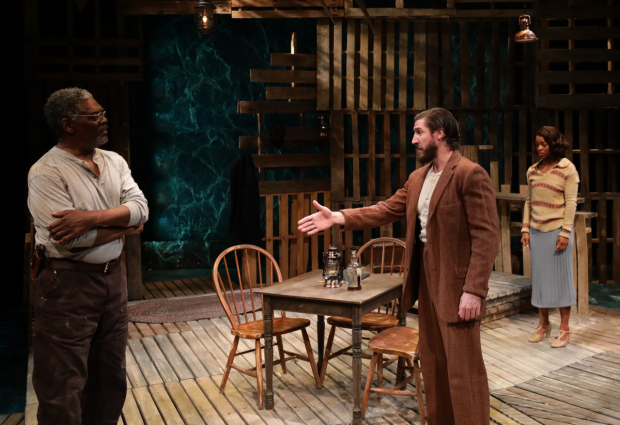Finding Hope Amid the Darkness in Anna Christie
Lyric Stage offers a stripped-down revival of this classic play about a love triangle.

(© Mark S. Howard)
If ever there were a dramatist who mined his life's experiences for his work, it was Eugene O'Neill, one of the greatest of American playwrights of the 20th century. In Anna Christie, he turned to his years at sea where he met outcasts from middle-class respectability: seamen who roamed the world, the downtrodden women they met in port, and the flotsam and jetsam washed up on shore, living in cheap, lonely rooms.
Anna Christie, which won O'Neill the second of his four Pulitzer Prizes, has long been relegated to his second tier of works. Less often revived than A Moon for the Misbegotten, The Iceman Cometh, and Long Day's Journey Into Night, which were written later, Anna Christie shares some of their themes, like in ancient Greek tragedy, the role of fate and the importance of alcohol in dulling the characters' despair.
Scott Edmiston, who directs the current revival of Anna Christie at Lyric Stage, has adapted it into a tight two-hour run-time (with intermission), and cut the characters down to five, omitting the colorful bar owner, Johnny the Priest, and stripping it of extraneous characters that provided a sense of atmosphere to the New York waterfront setting.
After her mother died, Anna's seagoing father, Chris Christopherson, left her to be raised by relatives on a farm in Minnesota, where she was abused and raped. She has communicated with her father only by letters, hiding the truth of her past as a prostitute. When Anna arrives in New York looking for the father she hasn't seen for 15 years, he takes her in to live with him on the coal barge he captains. Her new life leads her to fall in love with a shipwrecked sailor named Mat Burke. The men's illusions about Anna's past and their expectations about her future point to a confrontation, but O'Neill wrote a seemingly "happy" ending that has been decried by critics since the play's premiere on Broadway in 1921.
Edmiston's taut production, staged on an evocative setting of bare wooden pallets backed by a glimmering sea (designed by Janie E. Howland and lighted by Karen Perlow), is blessed by a trio of strong actors: Johnny Lee Davenport as the guilt-ridden Chris, Dan Whelton as the idealistic hunk Mat, and especially the glowing Lindsey McWhorter as Anna. Nancy E. Carroll makes a cameo appearance as Chris's soon-to-be-gone mistress. Although the actors had not jelled as an ensemble by the opening performance, the individual characterizations are memorable. McWhorter makes her first appearance, standing brave but weary, in the doorway of the tavern with a single suitcase in hand; her performance builds to a searing soliloquy in which she spits out the truth about her past to her father and lover.
In his last lines in Anna Christie, Chris declares, "Fog, fog, fog, all bloody time. You can't see where you vas going, no….," while Anna and Mat stare at him. O'Neill's final stage direction reads, "From the harbor comes the muffled, mournful wail of steamers' whistles" — not exactly the promise of happiness for Anna or the men who love her, but not quite the typically dark and tragic O'Neill ending either.











